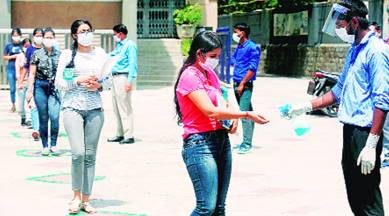Ritika Chopra, an award-winning journalist with over 17 years of experience, serves as the Chief of the National Bureau (Govt) and National Education Editor at The Indian Express in New Delhi. In her current role, she oversees the newspaper's coverage of government policies and education. Ritika closely tracks the Union Government, focusing on the politically sensitive Election Commission of India and the Education Ministry, and has authored investigative stories that have prompted government responses. Ritika joined The Indian Express in 2015. Previously, she was part of the political bureau at The Economic Times, India’s largest financial daily. Her journalism career began in Kolkata, her birthplace, with the Hindustan Times in 2006 as an intern, before moving to Delhi in 2007. Since then, she has been reporting from the capital on politics, education, social sectors, and the Election Commission of India. ... Read More
JEE Day 1 goes off with social distancing & sanitisers
Low attendance aside, the examination was conducted smoothly across the country.

The first day of Joint Entrance Examination (JEE)-Main saw relatively low attendance of approximately 65% to 70%, according to a government official. Day one was meant only for candidates registered for Paper 2, also known as the aptitude paper for B.Arch and B.Planning. About 1 lakh candidates were expected to appear for Paper 2 Tuesday.
Low attendance aside, the examination was conducted smoothly across the country. Higher education secretary Amit Khare released a brief statement Tuesday evening thanking the states for their cooperation.
Read | JEE Day 1 goes off with social distancing & sanitisers
Government officials were not worried over the low turnout. “Paper 2 has always had low attendance even in the past, since only those candidates serious about studying architecture end up writing the exam. Many students register for it but do not turn up,” said a senior official. However, the officer admitted Tuesday’s attendance was even lower than the usual standard.
Another official attributed the low attendance to the delay in conducting the entrance test. “Students could have taken admission in private institutions in the meantime,” the second officer said. Asked if the low attendance could be because of inadequate travel arrangement on the ground for students to reach their test centres, the officer said, “We don’t think so since states have cooperated and arranged for travel to the examination centres,” the second officer added.
Distribution of masks inside the exam centres, staggered entry and exit, hand sanitisers at the gate, seating with social distancing were some of the Covid-19 precautions in place.
In video | How JEE aspirants took exam amid pandemic
The JEE-Main, the first national-level entrance exam since the COVID outbreak, will be held in two shifts from September 1 to 6. About 8.58 lakh students have registered for it.
Unlike other years, there were no crowds outside the exam centres. Security guards stationed at different points outside ensured that parents did not crowd when their children stepped out. Similarly, students entered and left in lines, maintaining distance.
The students’ hands were sprayed with sanitiser, both as they entered and left. At an exam centre in Noida, announcements were made about maintaining social distancing.
Students said social distancing measures were in place inside the exam rooms too. Each student was given a 3-ply mask.
Read | NTA JEE Main 2020 B Arch, B.Plan analysis: ‘Maths was lengthy, paper easier than last session,’
“Inside the room, we were seated with gaps of two seats. We were given masks and there were a number of sanitisation points. There were only 26 students in the room,” said Pranjal Meena (17) at the exam centre in Vivek Vihar.
Ishita Kumari (18) reached her centre in Dilshad Garden much in advance. She said the admit card came with four pages of instructions. The guidelines stated that a gap of two seats would be maintained, students would be provided 3-ply face masks, and they should sign and thumb-print their forms beforehand.
“Since the lockdown, my father, who works in the private sector, stopped receiving his salary. I did not attend any coaching class in the last few months because they are expensive. I prepared with the help of YouTube videos,” she said.
As reported by The Indian Express, the National Testing Agency (NTA) has increased the number of test centres. The number of shifts has been increased from eight to 12, and the number of candidates per shift reduced from 1.32 lakh to 85,000. Candidates have been assigned time slots for reporting at the centres to avoid crowding — a maximum of 40 students can report in one 20-minute slot.
Inputs from Aranya Shankar